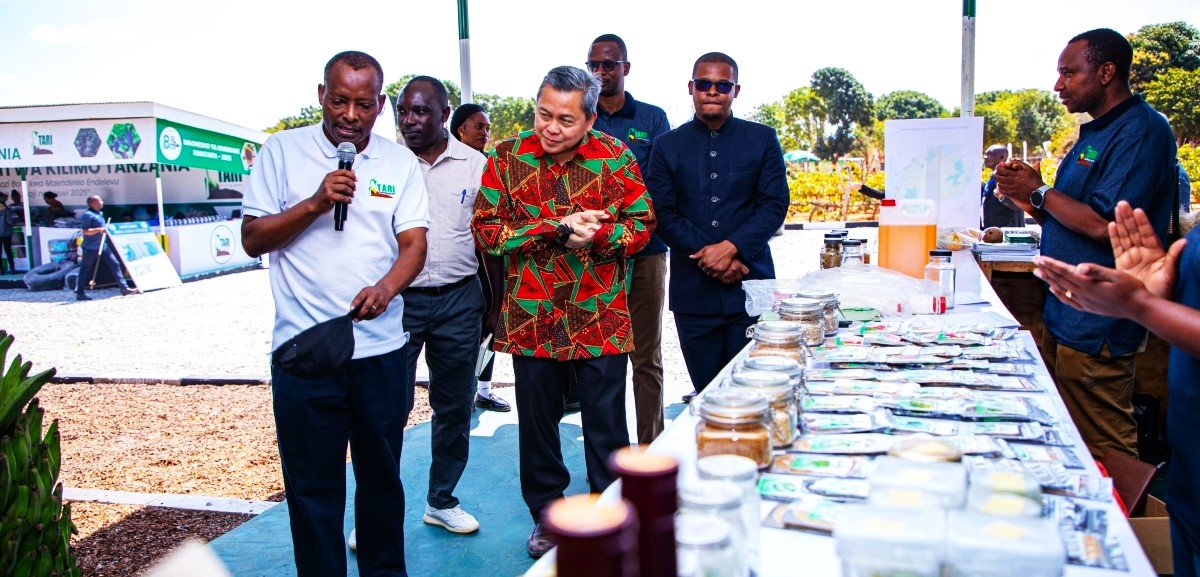The Republic of Indonesia has pledged to support Tanzania in adopting cloud seeding technology, a weather modification method aimed at enhancing rainfall to improve food production and mitigate the growing effects of climate change.
The announcement was made by Indonesian Ambassador to Tanzania, Tri Yogo Jatmiko, during the ongoing Nane Nane International Agricultural Exhibition, which is being held at the Nzuguni grounds in Dodoma. The annual event, observed every 8th of August, celebrates the vital role of farmers and brings together stakeholders from across the region to showcase innovations in agriculture.
Ambassador Jatmiko highlighted that Indonesia’s own success with cloud seeding—particularly in controlling forest fires and managing drought—could offer vital lessons for Tanzania, a country still largely dependent on rain-fed agriculture. He emphasized that Indonesia would not only provide technical assistance but also help train Tanzanian experts to implement the technology independently.
“With this technology, Tanzania can reduce its dependency on unpredictable weather and protect its food systems,” said the Ambassador. “We are committed to strengthening this partnership and building long-term resilience.”
Cloud seeding involves introducing substances such as silver iodide, potassium iodide, or dry ice into the atmosphere to stimulate cloud formation and enhance rainfall. It has been used in countries like China, the United Arab Emirates, and India as part of broader efforts to combat drought and improve water availability.
In Tanzania, where millions rely on agriculture for their livelihoods, erratic rainfall patterns and prolonged dry seasons have made farming increasingly risky. According to the Tanzania Meteorological Authority (TMA), recent years have seen a significant shift in rainfall distribution across regions like Kilimanjaro, Morogoro, and Dodoma—leading to reduced yields and rising food insecurity.
The partnership with Indonesia is expected to be implemented under a new Agricultural Cooperation Commission, set to launch later this year. This framework will also include exchanges in sustainable irrigation, soil health, crop research, and the use of digital farming tools—all aimed at modernizing Tanzania’s agriculture sector.
Also Read; TRA Grants Tax Amnesty for Non-Compliant Vehicles
Speaking during the exhibition, Director General of the Tanzania Agricultural Research Institute (TARI), Dr. Geofrey Mkamilo, welcomed the initiative, noting that such technology could significantly transform farming in Tanzania.
“Our farmers need tools that can help them plan better, especially in the face of climate change. Cloud seeding offers a new way forward,” he said. “With the support of Indonesia, we can localize this innovation and build a more food-secure future.”
Tanzania and Indonesia share a long history of bilateral relations, dating back to the 1960s, rooted in non-alignment and South–South cooperation. Past collaborations include joint agricultural training programmes and rural development projects.
The Indonesian embassy in Dar es Salaam has also hinted at possible involvement of aeronautical experts and meteorologists from both countries to study the viability of cloud seeding in regions most affected by rainfall shortages, such as Singida, Shinyanga, and Arusha.
While cloud seeding has shown promise globally, its effectiveness depends on various factors—such as cloud types, humidity, and altitude. According to a 2024 report by the U.S. Government Accountability Office, rainfall increases due to cloud seeding can vary from negligible to as much as 15–20%, depending on conditions. Thus, rigorous pilot testing and monitoring will be crucial to the programme’s success in Tanzania.
Environmental experts also stress the need to complement weather modification with climate-smart agriculture, early warning systems, and community-based water management to ensure lasting impact.
This partnership marks a new chapter in East Asia–Africa collaboration on climate resilience. As the Nane Nane celebrations continue, the spotlight is now on how such innovations can be scaled up to serve not only Tanzania—but also neighbouring countries facing similar climate risks.







